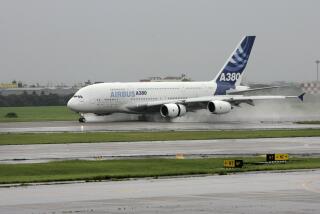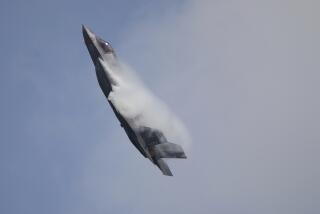Missing Flier Is at the Heart of Beijing’s Reaction
- Share via
BEIJING — His name is Wang Wei. He has been called an “outstanding pilot” in the Chinese air force. And most likely, he is dead.
Until today, those three sentences summed up virtually all that was publicly known about the Chinese airman who has been missing since he bailed out of his F-8 fighter jet following a collision Sunday with a U.S. spy plane over the South China Sea.
Yet in spite of the scant information, Wang lies close to the heart of China’s response to the midair crash and the subsequent diplomatic standoff with Washington.
The missing pilot’s fate and how Beijing has played the story are important clues to the motivations and challenges behind the Communist regime’s handling of the incident.
From the beginning, officials here have contended that the U.S. Navy EP-3 reconnaissance plane abruptly veered into the path of Wang’s jet--a version of events that the U.S. disputes. Wang managed to eject before his aircraft crashed, Chinese officials say, but the search for him has been fruitless.
That Wang is probably dead is one of the factors in Beijing’s reaction to and characterization of the event.
“China is the victim,” Foreign Ministry spokesman Zhu Bangzao declared on Tuesday. “The damaged aircraft is Chinese; the missing pilot is Chinese.”
Many people here feel that Wang’s fate has been ignored by the American side, which has focused on the 24 EP-3 crew members held on Hainan island in southern China.
With one of its airmen presumed dead--and so close to its own coastline--China insists that the U.S. owes it an apology. On Wednesday, Secretary of State Colin L. Powell said the U.S. regretted the loss of Wang’s life, but he stopped short of an apology.
That it took days for the Bush administration to acknowledge Wang’s plight genuinely offended many here, who see it as proof of American arrogance. If a U.S. pilot had died in similar circumstances, they say, Americans would be up in arms.
“The U.S. always talks about the importance of human rights,” said Long Ying, 48, who works in the entertainment industry here. “Now our pilot is missing, and theirs are safe. Where are the human rights for the Chinese pilot?”
In their accounts of the accident, China’s state-controlled media have played up the Communist regime’s concern for Wang. More than 80 planes and ships have scoured the waters off Hainan looking for him, official reports say. Stories quote President Jiang Zemin ordering that the search continue “at any cost.”
Although Long complained that the U.S. has not aided rescue efforts, U.S. officials say they offered assistance but were turned down. That assertion has gone unreported in the media here as the government tries to shore up popular support through its monopoly on information.
The silence is reminiscent of what happened two years ago when the North Atlantic Treaty Organization bombed the Chinese Embassy in Belgrade, Yugoslavia, killing three people. The Americans labeled the bombing an accident and President Clinton apologized. But for days, the Chinese media said nothing about his statement, stoking the jingoistic anger that fed violent anti-American protests.
Many Chinese trace a direct line from Belgrade to Sunday’s collision and the probable death of yet another Chinese citizen, allegedly at American hands. The common thread in the incidents, they say, is U.S. hostility toward China.
“The embassy bombing last time was also done by the U.S. Why is the U.S. always making trouble for China?” said Zhang Yuanhang, 20, a university student here.
Tight control of the media has allowed the government to rally public support over the last few days and harden sentiment against the U.S.
But the regime also remains wary of a repeat of the days of rage in 1999, which nearly spun out of its control. China’s leaders know that the nationalistic fervor they have encouraged could quickly be turned against them if they appear weak in the confrontation with Washington.
“They realize they’ve got to keep that [passion] tamped down,” said June Teufel Dreyer, a China expert at the University of Miami. “Sometimes we give them more credit to control things than they actually have.”
On Wednesday, police turned away three protesters carrying a Chinese flag who had approached the U.S. ambassador’s residence here, Reuters news service reported. Security around U.S. diplomatic buildings has been tightened to guard against an outbreak of violent opposition.
To keep public sentiment manageable, Beijing’s treatment of the missing pilot has been much more cautious so far than the government-directed media frenzy surrounding the victims of the embassy bombing.
Then, the three people who died were declared martyrs. Newspapers rushed to print bloody photographs and sensational profiles. The victims’ funerals were broadcast on national television.
This time, personal details about Wang were absent for days. He was nameless until late Tuesday, and a photo of him did not appear until Wednesday.
The most that was said of him was that he was “an outstanding pilot” and team leader. The government did not respond to requests Wednesday for even such basic information as rank and age. Beijing seemed content for Wang to remain a useful abstraction, an impersonal icon of U.S. “hegemonism.”
Early today, the official New China News Agency finally began to release more information. In a short dispatch from Hainan, the agency said Wang’s wife, Ruan Guoqin, is so grief-stricken that she is hospitalized.
In an interview, Ruan said she and the couple’s 6-year-old son are desperate for his return. Another story said Wang was born in 1968 and hails from coastal Zhejiang province, where his aging parents still live.
It is possible that a fuller biography is being saved until he is declared dead, to be released for maximum impact. There were signs Wednesday of a harsher tone in the official media’s description of the collision and demand for a U.S. apology.
But tempered views exist among the Chinese, as well as more belligerent ones.
“China wants the U.S. to apologize, while the U.S. asks China to return their plane and crew. It seems that both demands are reasonable,” said Mao Li, a 42-year-old Beijing housewife. “Each side ought to reach a compromise through negotiations and find a solution.”
More to Read
Sign up for Essential California
The most important California stories and recommendations in your inbox every morning.
You may occasionally receive promotional content from the Los Angeles Times.











